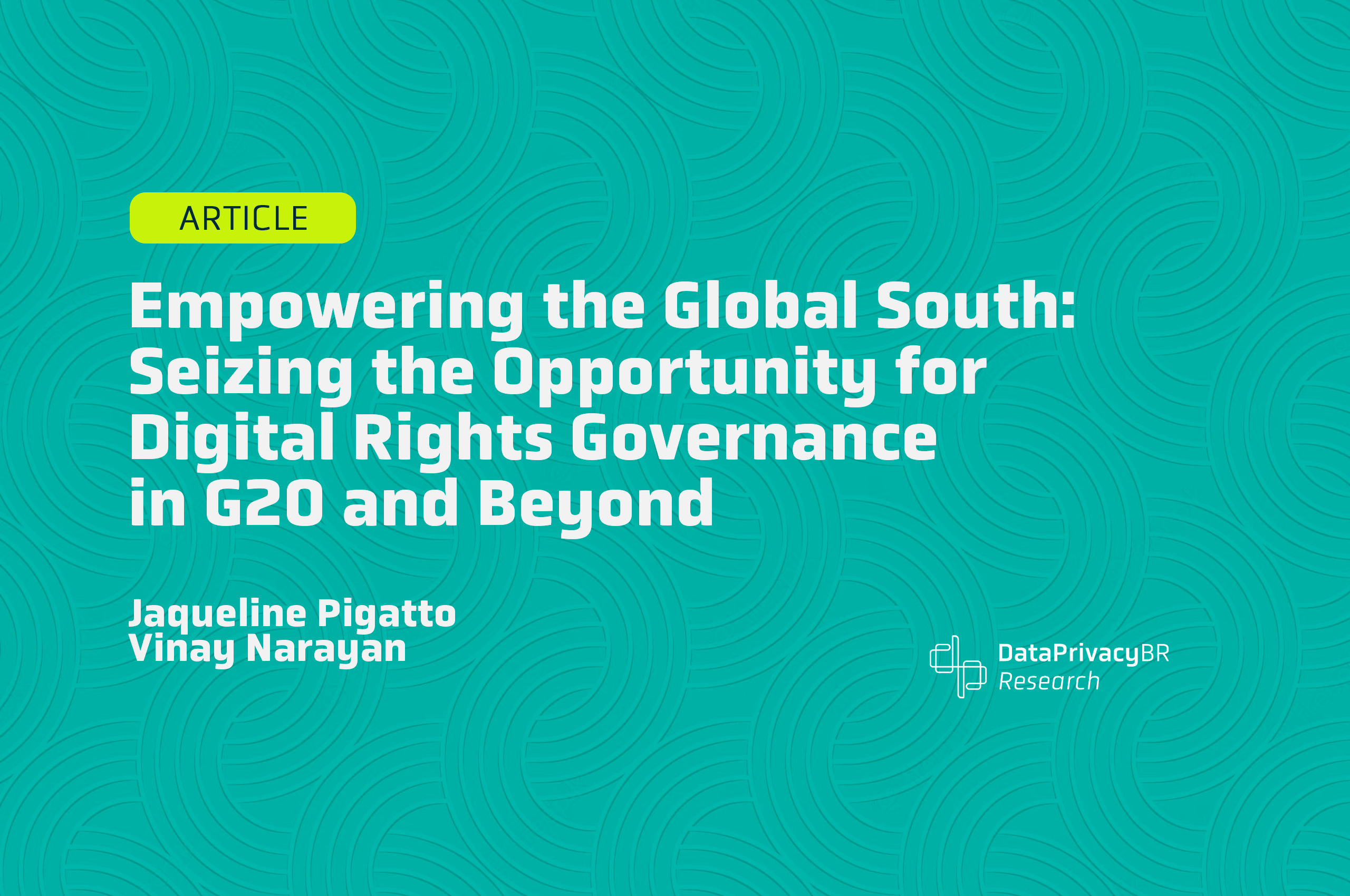Empowering the Global South: Seizing the Opportunity for Digital Rights Governance in G20 and Beyond
The G20 represents a critical policy space for addressing emergent challenges on a global scale and its importance as a platform is pronounced when we consider its significance for the Global South.
By Jaqueline Pigatto
[1] [1] Jaqueline Pigatto is a research coordinator in the field of Governance and Regulation at the Data Privacy Brazil Research Association.and Vinay Narayan
[2] [2] Vinay Narayan is a Senior Manager at Aapti Institute, India
The G20 represents a critical policy space for addressing emergent challenges on a global scale and its importance as a platform is pronounced when we consider its significance for the Global South. Between 2022 and 2025, four countries from the Global South are assuming the presidency of the Group, setting a unique opportunity to develop an agenda with these people’s interests.
Historically, international decision-making has often been dominated by powers and institutions from the Global North, who often have the most say in setting the agenda. The G20, instead, provides an opportunity for emerging economies and developing nations from the Global South to set the agenda and have it reflect their priorities. Between 2023 and 2024, India and Brazil are sharing their common concerns, especially with regard to the digital agenda, aiming for their own levels of digital sovereignty.
One such area of commonality has been the push for digital public infrastructure (DPI). DPI, as the Indian G20 Presidency notes, can be understood as a set of shared digital systems which are secure and interoperable, built on open standards and specifications to deliver and provide equitable access to public and / or private services at societal scale and are governed by enabling rules to drive development, inclusion, innovation, trust, and competition and respect human rights and fundamental freedoms. The notion of DPIs has gained significant momentum in recent years and is in many ways a response to the rapid digitisation that has crept into various facets of our lives and the manner in which this has taken place – namely the private corporate ownership or control of most of the digital infrastructure used by society at large.
Messaging platforms (such as WhatsApp), e-commerce marketplaces (like Amazon and AliExpress), transportation providers (like Uber) and payment systems (like Apple Pay and Google Pay) have become intertwined with our daily lives, and are of critical importance to societal functions. WhatsApp’s global outage a few years back affected numerous businesses and public service delivery (with many countries running WhatsApp chatbots to provide public health updates). App-based transportation services such as Uber have had some negative impacts on public transport. Going beyond platforms and marketplaces, the specter of private ownership in digital infrastructure is most concerning when we look at cloud infrastructure. Three private companies – Amazon, Microsoft and Google – control nearly 2/3rd of the market share of cloud infrastructure and provide it to sectors of national importance.
Control over the digital infrastructure also provides private entities with effective control over the data generated by the use of these infrastructures. Insights derived from this data have significant potential for public good, but are often siloed with restricted access. The private ownership and control over these digital infrastructures and data within them is therefore of significant concern given the influence they wield, and their ability to cripple critical societal functions.
In this context, DPIs provide the ability to wrest back control of critical digital infrastructures and place them in the public domain – thereby enabling digital service delivery in a transparent and accountable manner while unlocking societal value to foster development. India’s Unified Payments Interface (UPI) is one such example. UPI is a payment system developed by the National Payments Corporation of India that facilitates instant inter-bank peer-to-peer and person-to-merchant transactions. UPI has significantly broadened access to digital banking and has become the most preferred mode of payment in India. The success of the UPI has also seen India share the technology with other countries including France, Australia, Singapore, UAE and Saudi Arabia.
DPIs could prove especially important for Global South nations in an environment where trends in cross-border data flows seem to be dominated by traditional powers. The Regional Comprehensive Economic Partnership (RCEP), formally signed in November 2020, represents the agreement with the largest number of parties committing to high-standard data and digital trade provisions, with 15 contracting parties. The RCEP provisions on cross border data flow and data localisation provide significant leeway to member states to put in place data localisation norms or norms that restrict cross border data flow. This is largely attributable to China, who has a preference for data localisation norms for certain categories of data, and a strong preference for oversight around data flows.
If the RCEP is an indicator of what a possible WTO Joint Initiative on E-commerce that has large scale global consensus could be like, it is likely that countries that are keen to maintain control over the flow of data will be legally free to do so. Adopting DPI systems can provide countries with greater autonomy over data flows involving their citizens as the underlying infrastructure for crucial public services is developed and built within the country.
Digital governance has been a historical multistakeholder topic, always involving debates and decisions in different spaces, with the private sector, civil society, technical community, and government representatives. However, with increasing participation and agenda-setting from the government and industry, there is a strong need for other actors to have their voices heard to ensure the equitable development of digital solutions. The G20 can play a pivotal role here through its official engagement groups – including Civil20 (for civil society), Labour20 (for trade unions) and Think20 (for think tanks). The convergence of agendas through different engagement groups can have significant power in surfacing critical issues before world leaders – and this is possible, especially for civil society with the C20 and T20 groups.
Given the common interests of the Indian and Brazilian G20 presidencies in digital strategy broadly and DPIs more specifically, the engagement groups are an apt forum for civil society organisations from both countries to further the agenda of equitable digital development. For example, Aapti Institute worked with the Indian G20 Presidency and the UNDP to create a handbook designed as a practical and public resource that low and middle-income countries (LMICs) in particular can utilize in building inclusive and rights-based DPIs.
For the 2024 presidency in Brazil, Data Privacy Brazil Research Association is articulating conversations among government members, civil society, and think tanks representatives to set the goals and priorities for the digital agenda. This partnership between the two institutions means that we can have a transfer of learnings and experiences with the G20 presidency from India to Brazil, thereby ensuring continuity in civil society’s engagement for equitable digital development.
This agenda, beyond the G20, should also find resonance within the BRICS, now expanded to BRICS+. These processes are clear signs of the Global South’s demand for effective participation in global governance, although there are concerns even within these spaces, regarding non-democratic countries. These new challenges require an even more active participation from civil society to ensure developments that are in line with fundamental rights and are genuinely beneficial to society. Demands on governments and proposals for the development of technologies and public services should prioritize open, safe, and inclusive spaces, emphasizing transparency and multistakeholder dialogue. The legitimacy of these spaces will be determined by their alignment with the agendas set forth by civil society and experts in areas such as artificial intelligence, information integrity, and digital public infrastructure. Furthermore, global civil society should seize the opportunity to elevate a common agenda from engagement groups that cannot be ignored by this governance.
Veja também
-
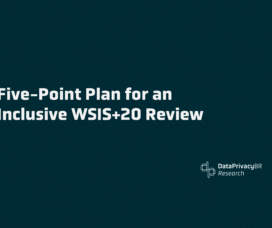
Five-Point Plan for an Inclusive WSIS+20 Review
As stakeholders engaged in the WSIS+20 Review process, organizations sign the petition presenting recommendations to help operationalize the WSIS+20 review modalities in order to ensure transparency, inclusion, and meaningful stakeholder engagement.
-
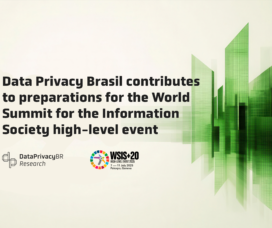
Data Privacy Brasil contributes to preparations for the World Summit for the Information Society high-level event
The event, which is co-organized by the ITU, UNESCO, UNDP, and UNCTAD, takes place in July, and this March, stakeholders were able to send their suggestions regarding the format and content to be debated, especially in light of the review process.
-

Data Privacy Brasil goes to the Digital Rights and Inclusion Forum (DRIF)
For the third consecutive year, Data Privacy Brasil will participate in the Digital Rights and Inclusion Forum (DRIF). DRIF – formerly known as the Internet Freedom Forum (IFF) – is an annual forum organized by Paradigm Initiative (PIN), since 2013, to be a space for discussions on global issues related to digital rights and inclusion.
-
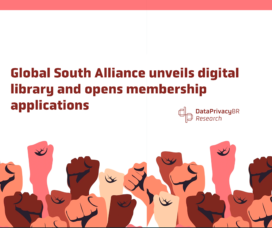
Global South Alliance unveils digital library and opens membership applications
The GSA invites organizations to express their interest in joining the network by completing the application form available until April 24.
-
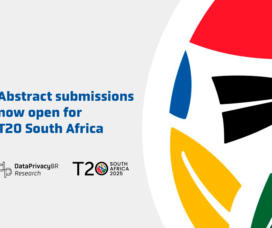
Abstract submissions now open for T20 South Africa
The Think20 South Africa invites researchers from around the world to contribute to a dynamic exchange of ideas on today's most pertinent challenges. The deadline for submitting abstracts is February 10, 2025.
-
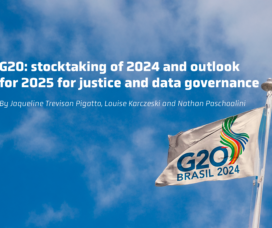
G20: stocktaking of 2024 and outlook for 2025 for justice and data governance
In 2024, Data Privacy Brasil took on a new and exciting challenge: participating in the G20 ecosystem, during the Brazilian presidency, through the official engagement group for think tanks, Think 20 (T20). Check out the text to learn more about Data's work at the G20.
-
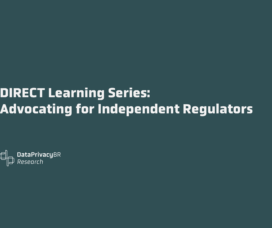
DIRECT Learning Series: Advocating for Independent Regulators
The 6th workshop took place on November 6th, 2024, in the context of the Data Rights and Enforcement through Community Trust (DIRECT) Learning Series, an ongoing thematic series of workshops with members of the DIRECT consortium, supported by Internews.
-

Exploring Opportunities in the Digital Economy and AI at the G20
The task force 5 of T20 Brasil has engaged several international think tanks to provide ideas and policy proposals on crucial areas of technological development, such as AI and Digital Public Infrastructures. This includes encouraging G20 nations to adopt policies that protect individual rights while fostering innovation.
Veja Também
-

Five-Point Plan for an Inclusive WSIS+20 Review
As stakeholders engaged in the WSIS+20 Review process, organizations sign the petition presenting recommendations to help operationalize the WSIS+20 review modalities in order to ensure transparency, inclusion, and meaningful stakeholder engagement.
-

Data Privacy Brasil goes to the Digital Rights and Inclusion Forum (DRIF)
For the third consecutive year, Data Privacy Brasil will participate in the Digital Rights and Inclusion Forum (DRIF). DRIF – formerly known as the Internet Freedom Forum (IFF) – is an annual forum organized by Paradigm Initiative (PIN), since 2013, to be a space for discussions on global issues related to digital rights and inclusion.
-

Global South Alliance unveils digital library and opens membership applications
The GSA invites organizations to express their interest in joining the network by completing the application form available until April 24.
-

Abstract submissions now open for T20 South Africa
The Think20 South Africa invites researchers from around the world to contribute to a dynamic exchange of ideas on today's most pertinent challenges. The deadline for submitting abstracts is February 10, 2025.
-

G20: stocktaking of 2024 and outlook for 2025 for justice and data governance
In 2024, Data Privacy Brasil took on a new and exciting challenge: participating in the G20 ecosystem, during the Brazilian presidency, through the official engagement group for think tanks, Think 20 (T20). Check out the text to learn more about Data's work at the G20.
-

DIRECT Learning Series: Advocating for Independent Regulators
The 6th workshop took place on November 6th, 2024, in the context of the Data Rights and Enforcement through Community Trust (DIRECT) Learning Series, an ongoing thematic series of workshops with members of the DIRECT consortium, supported by Internews.
-

Exploring Opportunities in the Digital Economy and AI at the G20
The task force 5 of T20 Brasil has engaged several international think tanks to provide ideas and policy proposals on crucial areas of technological development, such as AI and Digital Public Infrastructures. This includes encouraging G20 nations to adopt policies that protect individual rights while fostering innovation.
-

DIRECT Learning Series: data protection training and capacity building
The 5th workshop took place on October 2nd, 2024, in the context of the Data Rights and Enforcement through Community Trust (DIRECT) Learning Series, an ongoing thematic series of workshops with members of the DIRECT consortium, supported by Internews.
-
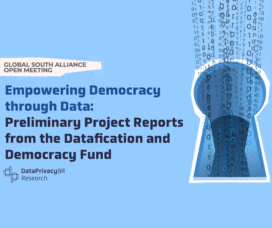
Empowering Democracy through Data: preliminary project reports from the DDF
The Global South Alliance wil host its next open meeting on October 22, 2024, where grantees from the first cohort of the Datafication and Democracy Fund (DDF) will present their impactful research.
-

Protean acknowledged for leadership in digital public infrastructure
A report from Data Privacy Brasil underscores how DPI can be leveraged to create environments where data privacy and security are prioritized.
-

DIRECT Learning Series: strategies for meaningful engagement in the context of implementation of Digital ID systems
This workshop took place on August 28th, 2024, in the context of the Data Rights and Enforcement through Community Trust (DIRECT) Learning Series, an ongoing thematic series of workshops with members of the DIRECT consortium, supported by Internews.
-

G20 Engagement Groups Issue Joint Declaration on Artificial Intelligence
On Tuesday (10), the main G20 engagement groups, including Civil 20 (C20), Labor 20 (L20), Think 20 (T20) and Women 20 (W20), announced a groundbreaking joint statement on the ethical, sustainable and inclusive development and deployment of artificial intelligence (AI).
-
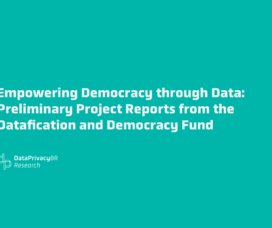
Empowering Democracy through Data: Preliminary Project Reports from the Datafication and Democracy Fund
The Global South Alliance held its first meeting with the organizations covered by the Datafication and Democracy Fund. On the occasion, each of the five organizations - Like a Palm Tree (Africa), Center of Security and Citizenship Studies (LatAm), Corporación Cambio Sostenible (LatAm), Criminal Justice & Policy Accountability Project (India), and Ikigai Innovation Initiative (Africa) - had the opportunity to present the preliminary results of their projects and hear feedbacks from the GSA members.
-
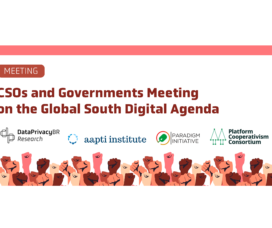
CSOs and Governments Meeting on the Global South Digital Agenda
On September 21st and 24th, the event “Open Dialogue: Global South Alliance and Governments for an Inclusive Digital Agenda” will take place, promoted by the organizations Data Privacy Brasil, Aapti Institute, Paradigm Initiative and PCC (The New School). The event aims to provide an open conversation with diplomats about the international agenda for IPRs, AI, GDC implementation and G20 continuity.
-
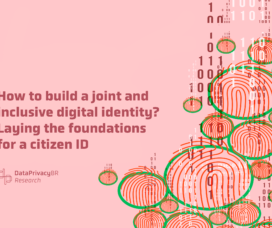
How to build a joint and inclusive digital identity? Laying the foundations for a citizen ID
Do you know what an identity is? Thinking about facilitating access to the topic, Data Privacy Brasil has developed a series of content to provide the foundations and tools possible for all the details on the subject. With this, we will be able to discuss, as a community, what we want with a digital identity and how we can achieve it.
-
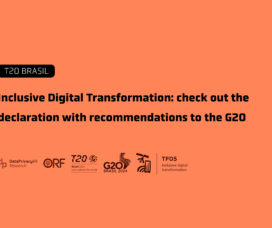
Inclusive Digital Transformation: check out the declaration with recommendations to the G20
In the document, six priorities were defined to deal with issues such as digital inclusion and meaningful universal connectivity; and challenges, opportunities and governance of artificial intelligence.
-
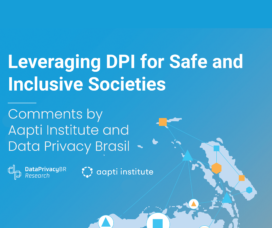
Leveraging DPI for Safe and Inclusive Societies
Aapti and Data Privacy Brasil have submitted their contribution to the Office of the United Nations Secretary-General's Envoy on Technology (OSET) and the United Nations Development Programme (UNDP) regarding the report "Leveraging DPI for Safe and Inclusive Societies".
-
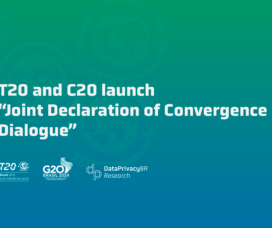
T20 and C20 launch “Joint Declaration of Convergence Dialogue”
On the 2nd and 3rd of July, a Mid-Term Conference took place in Rio de Janeiro, a T20 event with the participation of leaders from national and international think tanks, members of academia, representatives of the private and public sectors and civil society to discuss and propose solutions to the main global challenges.
-

Datafication and Democracy Fund welcomes five organizations from the Global South for short-term projects
The Datafication and Democracy Fund Committee, composed of Data Privacy Brasil, Paradigm Initiative, and Aapti Institute, is pleased to announce the five organizations awarded funding for a short-term research project.
-
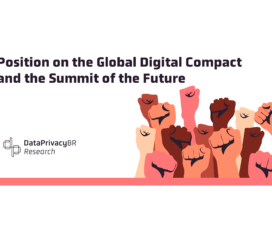
Position on the Global Digital Compact and the Summit of the Future
Between the 9th and 10th of May, the UN Civil Society Conference is happening in Nairobi. The event is presented as an opportunity to engage civil society in preliminary discussions ahead of the Summit of the Future.
-
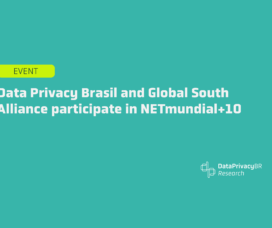
Data Privacy Brasil and Global South Alliance participate in NETmundial+10
Between April 29th and 30th, the NETmundial+10 took place in São Paulo. Building upon the event and the NETmundial Declaration of 2014, this event focused on strengthening global multistakeholder governance for the Internet and digital technologies, as well as conveying messages to global actors for better coordination of various ongoing processes.
-
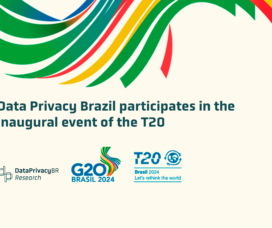
Data Privacy Brazil participates in the inaugural event of the T20
Between March 4th and 6th, the Organizing Committee of T20 Brazil - composed of CEBRI, FUNAG, and IPEA - held the first official event of the engagement group. The event took place entirely virtually and was openly broadcast to the public.
-

Inclusive Digital Transformation in the T20
The year 2024 marks Brazil's presidency in the G20, the group of the world's largest economies, chaired by our country for the first time. It is a year of great opportunity for Brazil to influence a broad global governance agenda, prioritizing issues such as inequality, climate change, and, of course, digital transformations.
-
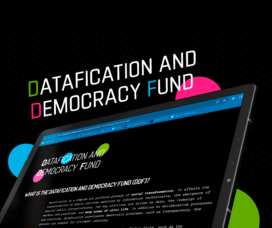
Data Privacy Brasil, Paradigm Initiative and Aapti Institute announce the launch of the “Datafication and Democracy Fund”
The fund aims to finance activities that strengthen the work of NGOs in the Global South on issues of datafication and democracy
-
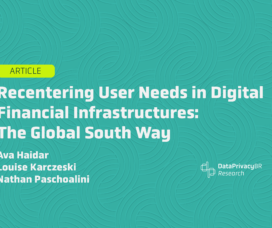
Recentering User Needs in Digital Financial Infrastructures: The Global South Way
Through India’s G20 leadership in 2023, global agendas of digital transformation and financial growth have come to be intimately reoriented to challenges, priorities and special developments in the Global South.
-

At UNCTAD eWeek, Data Privacy Brasil will discuss the intersection between digital economy and human rights in AI regulation
The UNCTAD eWeek, an initiative of the United Nations Conference on Trade and Development (UNCTAD) in partnership with eTrade for all, will occur from the 4th until the 8th of December.
-
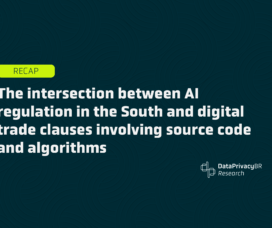
The intersection between AI regulation in the South and digital trade clauses involving source code and algorithms
Recap of Session 43 of the WTO’s 2023 Public Forum organized by Data Privacy Brasil and REBRIP
-
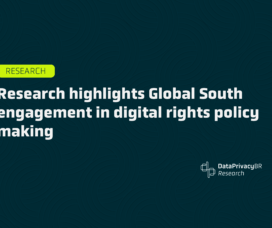
Research highlights Global South engagement in digital rights policy making
The Data Privacy Brasil Research Association announces the launch of the research report on Global South perspectives on international engagement in digital rights.
-
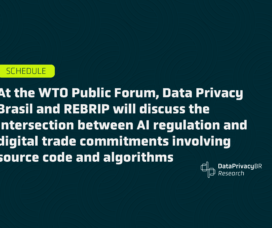
At the WTO Public Forum, Data Privacy Brasil and REBRIP will discuss the intersection between AI regulation and digital trade commitments involving source code and algorithms.
The WTO Public Forum 2023 will take place between September 12th and 15th in Geneva.
-

Data Privacy Brasil’s contribution to the Thematic Deep Dive of Artificial Intelligence and other Emerging Technologies of the Global Digital Compact
As other civil society organizations already pointed out, notable preference was given to the speech of Member States, UN agencies, and the private sector, at the expense of human rights civil society organizations, which prevented the speech that had been prepared by the DBPR and other civil society stakeholders.
-
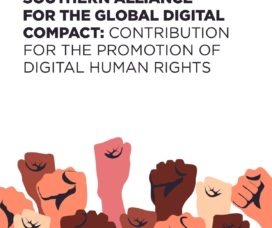
Southern Alliance for the Global Digital Compact
Responding to the call made by the United Nations, the Data Privacy Brazil Research Association, together with organizations from the Global South, presents a contribution to the Global Digital Compact.
-

Data Privacy Brasil Research Association contributes to UN open call on the relationship between human rights and technical standard-setting processes
We received a call as an opportunity to submit suggestions to inform the OHCHR report on the relationship between human rights and standard-setting processes for new and emerging digital technologies.
-
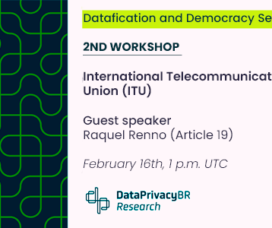
Our second workshop of a series about technical forum talks about the International Telecommunications Union
In the second meeting of the Datafication and Democracy Workshop Series, we received Raquel Renno, Digital Programme Officer of Article 19, who spoke about the International Telecommunication Union (ITU) for third sector organizations.
-
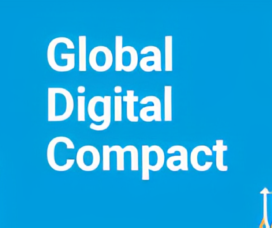
Let’s stay tuned for the Global Digital Compact
What is the Global Digital Compact and why is it important to keep an eye on it?
-

Why should we all pay attention to the Brazilian Digital ID system?
The implementation of digital identity systems is increasing around the world, especially in Global Southern countries. The model widely adopted is known as Big ID, promoted by or linked to public administration bodies which use centralized biometric databases to identify and authenticate citizens (Access Now, 2021).
DataPrivacyBr Research | Content under licensing CC BY-SA 4.0

